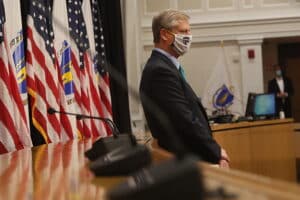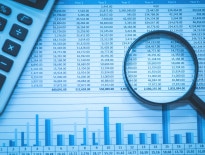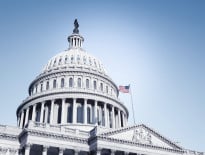
Gov. Charlie Baker listens as Marylou Sudders, Secretary of Health and Human Services speaks during a media briefing on Oct. 27, 2020. Photo by Suzanne Kreiter | Globe Staff/Pool
With a second surge of COVID-19 transmission still underway as the holiday season begins, Gov. Charlie Baker brushed away “rumor-mongering” that the state will soon tighten restrictions but flagged clusters in houses of worship as a growing concern.
The administration is not planning any additional closures or changes to the pandemic-prompted regulations in place, though officials continue to monitor public health data, Baker said at a Tuesday press conference.
That stands as a contrast to steps underway in other states where the outlook has been worsening. Rhode Island started a two-week pause on Monday that closed all gyms, bars and other recreational activities and banned all social gatherings, while New York also plans to ramp up steps such as halting elective surgeries in some areas.
“There’s been a lot of misinformation going around about things that are going to get shut down here, there, everywhere, at a moment’s notice. People have enough stress in their lives without having to deal with the rumor-mongering,” Baker said. “At this time, the commonwealth is not planning any additional closures or restrictions. We’ll continue to follow closely the public health data and continue to make decisions based on that.”
Confirmed new cases around the country have risen to unprecedented levels in recent weeks. In Massachusetts, spread has been significant over the past two months, with the average number of daily confirmed cases nearly 1,000 percent higher than the lowest values observed this summer.
The weighted average positive test rate sat at 3.9 percent on Monday, which is both the highest level since June and also well below the 20-plus percent rates in April when fewer tests were being conducted. Statewide, about two-thirds of non-ICU hospital beds are full, with less capacity remaining in Boston and the northeastern parts of the state.
Baker said Tuesday he was “pleased” to see lower travel volumes – about 40 percent of last year’s passengers went through TSA checkpoints, while bus and train travel over the weekend was only 20 percent of the prior year – but attention now turns to the string of holidays that some faiths celebrate in December.
Those who choose to see family or friends should prioritize safety, Baker said, by wearing masks, maintaining distance, avoiding shared food or drink and taking other health precautions that have become all too familiar. Most services and traditions “should and will look and feel different due to COVID,” he said.
An analysis by a team of epidemiologists the Department of Public Health tapped found that houses of worship in Massachusetts have been the source of dozens of COVID-19 clusters, spinning out into hundreds of confirmed cases.
Since the start of the pandemic, houses of worship have been home to 36 distinct clusters that are tied to 316 infections. Six of those clusters and 44 confirmed cases occurred in the past month alone, Baker said.
Faith leaders have responded “admirably,” Baker said, implementing creative strategies such as remote or in-vehicle services to limit transmission of the disease.
“But our data still found there are too many clusters that stem from houses of worship, and these cases spread out into the community at large,” he said.
Last week, the U.S. Supreme Court ruled that New York state’s COVID-era restrictions on religious services were unconstitutional. Baker said Tuesday that he believes Massachusetts should be immune from fallout in that case because, unlike New York, the state does not have different sets of standards for religious and non-religious gatherings.
“Our view is that as long as you don’t treat houses of worship differently than you treat other organizations with respect to the rules associated with occupancy levels and distancing and face coverings and all the rest – we believe that’s consistent with that decision,” he said.
Clusters are also on the rise in nursing homes, officials said, and at least one lawmaker, Rep. Mindy Domb, wants the Baker administration to turn its attention toward schools.
Domb, an Amherst Democrat, called Monday night for the DPH to investigate clusters identified so far in K-12 settings to help inform a response, arguing that getting a better understanding “is obvious and necessary.”
Asked about school clusters, Health and Human Services Secretary Marylou Sudders said DPH has identified 63 incidents of two or more individuals with COVID-19 in a school setting, including 112 students.
“If I use a base of 450,000, which I think is probably pretty conservative, that’s 0.02 percent of kids or anyone related to a school that’s related to a cluster,” Sudders said.






